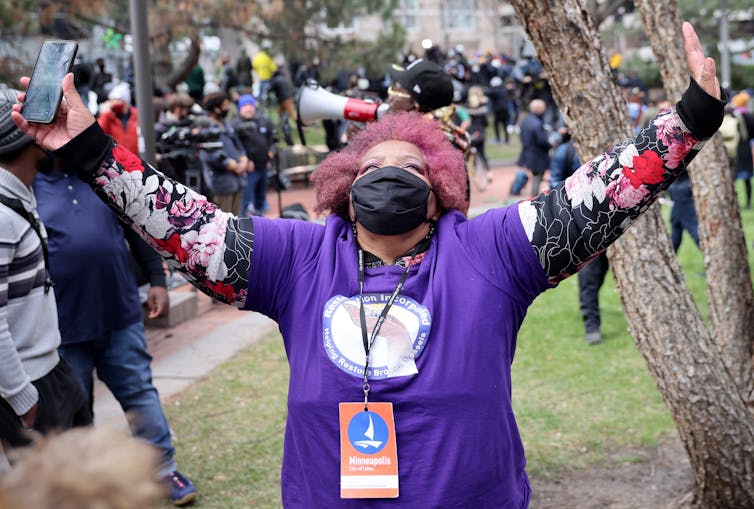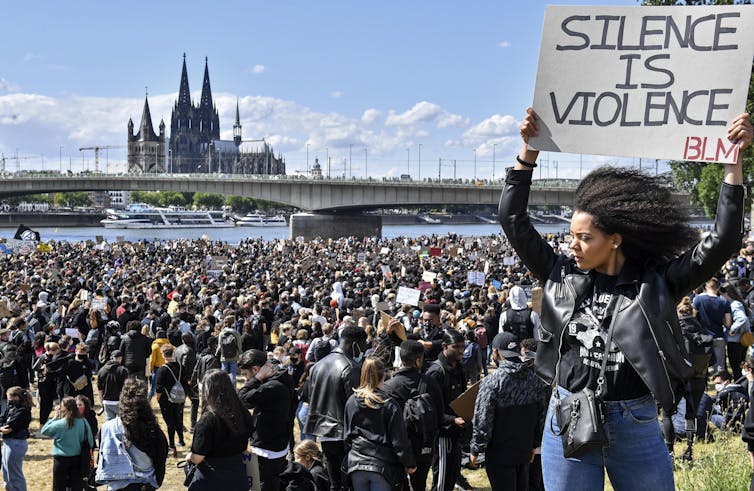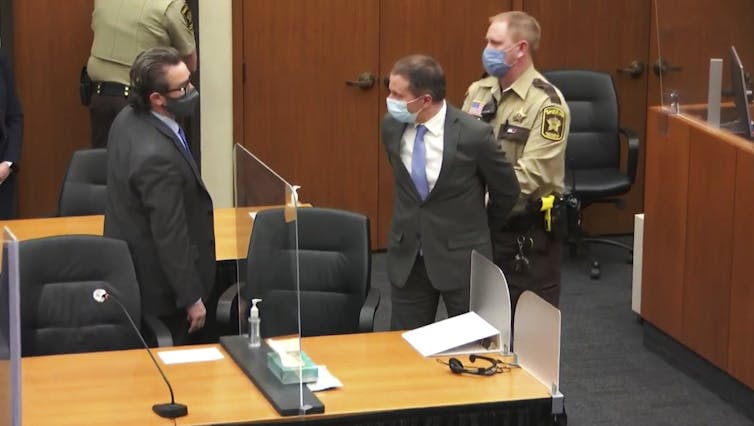
Experts in autocracies have pointed out that it is, unfortunately, easy to slip into normalizing the tyrant, hence it is important to hang on to outrage. These incidents which seem to call for the efforts of the Greek Furies (Erinyes) to come and deal with them will, I hope, help with that. As a reminder, though no one really knows how many there were supposed to be, the three names we have are Alecto, Megaera, and Tisiphone. These roughly translate as “unceasing,” “grudging,” and “vengeful destruction.”
The trial of Derek Chauvin is now over. The verdict was on one level expectable (God knows there was more than enough evidence and it was very clear), and yet, in our unwell society, unexpected. Let’s look at some takeaways while it is fresh in our minds.
================================================================
Why this trial was different: Experts react to guilty verdict for Derek Chauvin

Scott Olson/Getty Images
Alexis Karteron, Rutgers University – Newark ; Jeannine Bell, Indiana University; Rashad Shabazz, Arizona State University, and Ric Simmons, The Ohio State University
Scholars analyze the guilty verdicts handed down to former Minneapolis police officer Derek Chauvin in the 2020 murder of George Floyd. Outside the courthouse, crowds cheered and church bells sounded – a collective release in a city scarred by police killings. Minnesota’s attorney general, whose office led the prosecution, said he would not call the verdict “justice, however” because “justice implies restoration” – but he would call it “accountability.”
Race was not an issue in trial
Alexis Karteron, Rutgers University – Newark
Derek Chauvin’s criminal trial is over, but the work to ensure that no one endures a tragic death like George Floyd’s is just getting started.
It is fair to say that race was on the minds of millions of protesters who took to the streets last year to express their outrage and pain in response to the killing. Many felt it was impossible for someone who wasn’t Black to imagine Chauvin’s brutal treatment of George Floyd.
But race went practically unmentioned during the Chauvin trial.
This should not be surprising, because the criminal legal system writes race out at virtually every turn. When I led a lawsuit as a civil rights attorney challenging the New York Police Department’s stop-and-frisk program as racist, the department’s primary defense was that it complied with Fourth Amendment standards, under which police officers need only “reasonable suspicion” of criminal activity to stop someone. Presence in what police say is a “high-crime area” is relevant to developing reasonable suspicion, as is a would-be subject taking flight when being approached by a police officer. But the correlation with race, for a host of reasons, is obvious to any keen observer.
American policing’s most pressing problems are racial ones. For some, the evolution of slave patrols into police forces and the failure of decadeslong reform efforts are proof that American policing is irredeemable and must be defunded. For others, changes to use-of-force policies and improved accountability measures, like those in the proposed George Floyd Justice in Policing Act, are enough.
Different communities across the country will follow different paths in their efforts to prevent another tragic death like George Floyd’s. Some will do nothing at all. But progress will be made only when America as a whole gets real about the role of race – something the legal system routinely fails to do.
Why this trial was different
Ric Simmons, The Ohio State University
The guilty verdicts in the Chauvin trial are extraordinary, if unsurprising, because past incidents of police lethal use of force against unarmed civilians, particularly Black civilians, have generally not resulted in criminal convictions.
In many cases, the prosecuting office has been reluctant or halfhearted in pursuing the case. Prosecutors and police officers work together daily; that can make prosecutors sympathetic to the work of law enforcement. In the Chauvin case, the attorney general’s office invested an overwhelming amount of resources in preparing for and conducting the trial, bringing in two outside lawyers, including a prominent civil rights attorney, to assist its many state prosecutors.
Usually, too, a police officer defendant can count on the support of other police officers to testify on his behalf and explain why his or her actions were justified. Not in this case. Every police officer witness testified for the prosecution against Chauvin.
Finally, convictions after police killings are rare because, evidence shows, jurors are historically reluctant to substitute their own judgment for the split-second decisions made by trained officers when their lives may be on the line. Despite the past year’s protests decrying police violence, U.S. support for law enforcement remains very high: A recent poll showed that only 18% of Americans support the “defund the police” movement.
But Chauvin had no feasible argument that he feared for his life or made an instinctive response to a threat. George Floyd did nothing to justify the defendant’s brutal actions, and the overwhelming evidence presented by the prosecutors convinced 12 jurors of that fact.

AP Photo/Martin Meissner
The ‘thin blue line’ kills
Jeannine Bell, Indiana University
Like other high-profile police killings of African Americans, the murder of George Floyd revealed a lot about police culture – and how it makes interactions with communities of color fraught.
Derek Chauvin used prohibited tactics – keeping his knee on Floyd’s neck when he had already been subdued – to suffocate a man, an act the jury recognized as murder. Three fellow Minneapolis Police Department officers watched as Chauvin killed Floyd. Rather than intervene themselves, they helped him resist the intervention of upset bystanders and a medical professional. They have been charged with aiding and abetting a murder.
The police brotherhood – that intense and protective “thin blue line” – enabled a public murder. Police Chief Medaria Arradondo, unusually, broke this code of silence when he testified against Chauvin.
Research shows that even if officers see a fellow officer mistreating a suspect and want to intervene, they need training to teach them how to do so effectively. The city of New Orleans is now training officers to intervene. Once training is in place, police departments could also make intervention in such situations mandatory.
When some officers stand by as other officers ignore their training, the consequences can be dangerous – and potentially lethal – for civilians.

Court TV via AP, Pool
Minnesota faces its racism
Rashad Shabazz, Arizona State University
This verdict reflects a little-known truth about Minneapolis: As the city and metro region have become Blacker and more diverse, police violence against Black people has intensified. This is not to suggest that things have always been good for Black Minneapolis residents. Indeed, Minneapolis’ Black population – a group without political power or visibility – has faced segregation, police violence and Northern Jim Crow policies in its downtown music venues for decades.
White Minnesotans and Minneapolitans developed a false belief that somehow they were above racism; that their form of neighborliness known as “Minnesota nice” was an antidote to anti-Blackness and that – most of all – race didn’t matter in a place as nice as Minnesota.
That false assumption was easy to believe when the Black population was small, contained and largely out of sight. But Black Minneapolis’ population growth in recent decades, and the torrent of police violence that has followed, proved otherwise.
The murder of George Floyd last year and Daunte Wright’s killing in a nearby community last week demonstrate that despite the state’s liberal posture and Lutheran ethic, institutional anti-Black racism is as Minnesotan as ice fishing, untaxed groceries and “ya, sure, youbetcha” memes.
[Understand key political developments, each week. Subscribe to The Conversation’s election newsletter.]![]()
Alexis Karteron, Associate Professor of Law, Rutgers University – Newark ; Jeannine Bell, Professor of Law, Maurer School of Law, Indiana University; Rashad Shabazz, Associate Professor at the School of Social Transformation, Arizona State University, and Ric Simmons, Professor of Law, The Ohio State University
This article is republished from The Conversation under a Creative Commons license. Read the original article.
================================================================
Alecto, Megaera, and Tisiphone, I can’t agree with Alexas Karteron. Race may not have been used as an issue, but it was still very much an issue. Ric Simmons is right on about the attorney general’s involvement making a difference – and especially whan that AG is Keith Ellison. Jeannine Bal is not only right but has put her finger at or close to the heart of our biggest problem in the US. I hope Rashad Shabazz is right … but I’ll believe it when I see it.
The Furies and I will be back.
12 Responses to “Everyday Erinyes #263”
Sorry, the comment form is closed at this time.

“Ya, sure, you betcha!” I’m one of those 18%. The somewhat recognized structural racism in this country, is openly expressed in policing. Not that all police are bad, or necessarily racist, but it has become evident that policing, and its culture, are rancid with racism.
“…Lutheran ethic?” I used to have a buddy who was a Lutheran minister, in fact he married my first wife, and I. I would not think he was at all racist, and apparently, many religious people are not, but the overarching culture, within which any religion thrives, can be.
Momentum for equity has to be built on this conviction.
Thanks Joanne vaer sae gud–MN nice can indeed be lethal to some.
thank you….well said…..
American policing and jurisdiction has a long way to go when this trial is seen as different when it concerned itself with an everyday occurrence: the killing of black people, usually young men, by police officers. After hundreds of similar killings, finally a perpetrator – a white police officer – is brought to trial, which is in itself unusual, and convicted for second-degree murder, which is a landmark. Many hope it is a turning point and I find that terribly sad in itself. After all Martin Luther King and the activists that stood with him literally put their lives on the line for in the 60s, we haven’t progressed beyond hoping Floyd’s death and Chauvin’s trial will start a change.
It’s not for the Furies to change America. It is up to all Americans to acknowledge the racism that is running through the veins of the country before it can change.
Great words, Joanne
Finally. starting to see some justice served the way it should be for these racist police officers.
Like your article mentions, it has been ignored for way too long.
I was so pleased to see that on Wednesday, our new A. G. Merrick Garland announced that he was opening up an investigation of the Minneapolis Police and it’s practices/procedures.
I know the major here in San Diego spoke to our Police Department after the verdict was out. Praising the ones who do a good job, but warning the ones who don’t.
Hopefully other states will do the same.
Thanks again, Joanne
Thanks JD.
It’s time for all states to enact extreme police reforms!
These are what I believe are the Alpha and Omega photos of Derek Chauvin’s encounter with George Floyd:
ALPHA:
Sunglasses casually and jauntily perched on top his head; hands calmly placed in his pockets; a look of indifference if not also a little bit peeved (“What the hell are you people looking at? God, my right knee is killing me having to kneel on this damn pavement to keep this n****r down.”)
OMEGA:
JUSTICE! GUILTY ON ALL THREE COUNTS!
Wonderful. It’s nice to have both. There are too many Alpha pictures out there which have no Omega.
Yes, like TC wrote, it IS time for extreme police reforms! NOW!
AMEN, Nameless, your Alpha and Omega comment says it all, with pictures!!
p.s. I’m part of the 18%.
Thank you, Joanne. Excellent post.
I am also part of the 18% … as is Beau of the Fifth Column. I also support defunding the DODF, in the same way for the same reasons. “Defund” does not mean “abolish.”
Agree with you both 100% regarding being in the 18%.